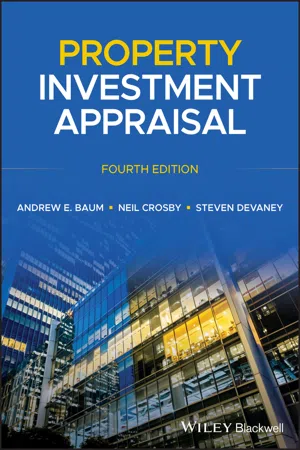
- English
- ePUB (mobile friendly)
- Available on iOS & Android
Property Investment Appraisal
About this book
Discover an insightful examination of the property investment appraisal process from leaders in the industry
This book explains the process of property investment appraisal: the process of estimating both the most likely selling price (market value) and the worth of property investments to individuals or groups of investors (investment value).
Valuations are important. They are used as a surrogate for transactions in the measurement of investment performance and they influence investors and other market operators when transacting property. Valuations need to be trusted by their clients and valuers need to produce rational and objective solutions. Appraisals of worth are even more important, as they help to determine the prices that should be paid for assets, even in times of crisis, and they can indicate market under- or over-pricing.
In a style that makes the theory as well as the practice of valuation accessible to students and practitioners, the authors provide a valuable critique of conventional valuation methods and argue for the adoption of more contemporary cash-flow methods. They explain how such valuation models are constructed and give useful examples throughout. They also show how these contemporary cash-flow methods connect market valuations with rational appraisals.
The UK property investment market has been through periods of both boom and bust since the first edition of this text was produced in 1988. As a result, the book includes examples generated by vastly different market states. Complex reversions, over-rented properties and leaseholds are all fully examined by the authors.
This Fourth Edition includes new material throughout, including brand new chapters on development appraisals and bank lending valuations, heavily revised sections on discounted cash flow models with extended examples, and on the measurement and analysis of risk at an individual property asset level. The heart of the book remains the critical examination of market valuation models, which no other book addresses in such detail.
Frequently asked questions
- Essential is ideal for learners and professionals who enjoy exploring a wide range of subjects. Access the Essential Library with 800,000+ trusted titles and best-sellers across business, personal growth, and the humanities. Includes unlimited reading time and Standard Read Aloud voice.
- Complete: Perfect for advanced learners and researchers needing full, unrestricted access. Unlock 1.4M+ books across hundreds of subjects, including academic and specialized titles. The Complete Plan also includes advanced features like Premium Read Aloud and Research Assistant.
Please note we cannot support devices running on iOS 13 and Android 7 or earlier. Learn more about using the app.
Information
1
Property Investment Appraisal in its Context
1.1 What is Appraisal?
the estimated amount for which an asset or liability should exchange on the valuation date between a willing buyer and a willing seller in an arm's length transaction after proper marketing and where the parties had each acted knowledgeably, prudently, and without compulsion.(IVSC 2019)
the value of property to a particular investor or class of investors, for identified investment objectives. This subjective concept relates specific property to a specific investor, group of investors, or entity with identifiable investment objectives and/or criteria.(IVSC 2007)
Table of contents
- Cover
- Table of Contents
- Title Page
- Copyright
- Preface
- 1 Property Investment Appraisal in its Context
- 2 Principles of Investment Analysis
- 3 The DCF Appraisal Model
- 4 The Evolution of Freehold Market Valuation Models
- 5 Contemporary Freehold Market Valuations
- 6 Freehold Market Valuations – Applications
- 7 Leasehold Valuations
- 8 Measurement and Pricing of Risk in Appraisals
- 9 Development Appraisal
- 10 Bank Lending Appraisals
- 11 Conclusions
- Bibliography
- Index
- End User License Agreement